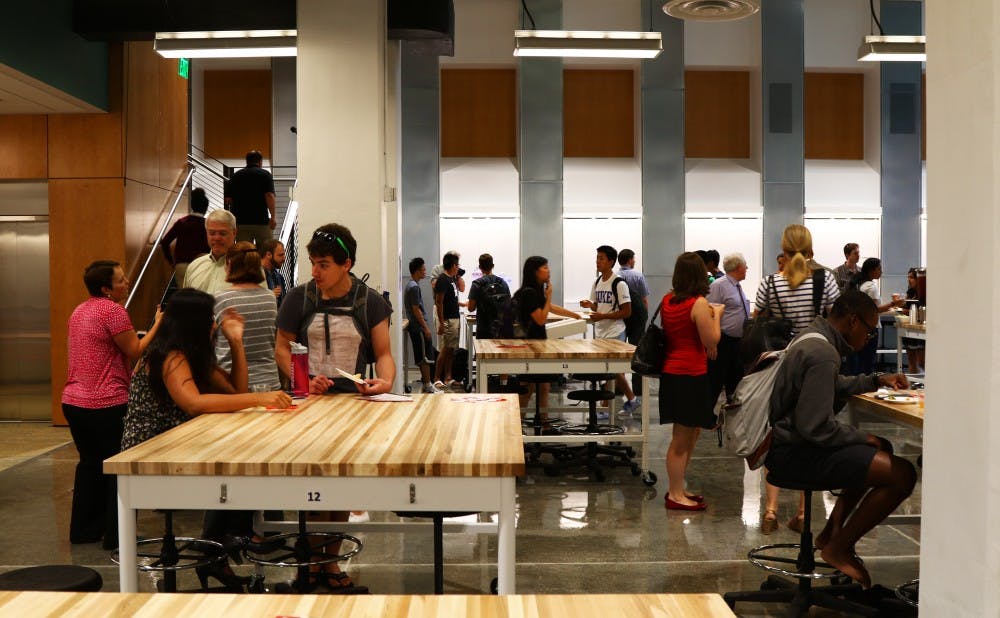Duke might now be home to one of the most technologically-advanced basements on Earth.
Approximately 100 students and faculty members gathered at Gross Hall Thursday evening for the opening of The Foundry—a new 7,600-square-foot facility designed to foster student and faculty-generated projects. The space, which features equipment such as optics, electronics shops and light machining tools, provides work space for several campus groups including DukeMakers and Duke Electric Vehicles.
“We had an idea—a new concept really—that what was practically office space in the new basement could actually turn into this really exciting environment for students to work with,” said George Truskey, interim dean of the Pratt School of Engineering, who led the development of the facility.
Truskey credited Robert Calderbank, professor of electrical and computer engineering and director of the Information Initiative at Duke, with proposing to create a design space in the basement of Gross Hall that could be used for student projects. Within Pratt, feasibility discussions soon followed, and talks with architects from the firm Lord, Aeck, Sargent began shortly afterward.
Although Lord, Aeck, Sargent surveyed 11 student teams across Pratt, the Nicholas School of the Environment, Duke University Energy Initiative and the Innovation & Entrepreneurship Initiative, Truskey explained that enthusiasm for the project was not unanimous.
“Two challenges we had to face is one, that it was a basement space, and people were turned off by the idea of a dark, dank basement, and then there were still people, particularly some of our alumni, who when we talked to them about it, were thinking of the Gross Hall that they used to go to as students,” Truskey said.
The opening of The Foundry marks the completion of renovations to Gross Hall. In 2014, the second and third floors of the building reopened after extensive updates, and previously much of the old laboratory space was turned into more modern offices and seminar rooms.
Previous renovations focused on creating space for programs like the Social Science Research Initiative, but Truskey noted that the meetings architects had with students should ensure that The Foundry effectively facilitates student innovation.
“Those meetings were basically about how best students would like to see the space being used,” said Swaminathan Kumar, a masters in engineering management student and communications manager for DUhatch, which uses space on the facility's upper level. “It's been created generously with a lot of projects and hardware in mind."
In addition to housing DUhatch, The Foundry's upper level—which is comprised primarily of project rooms and an automotive garage—hosts The Duke Robotics Club, Electrical and Computer Engineering Graduate Team Design Challenge, Duke Makers and Duke Electric Vehicles. The facility's lower level has large group workspaces and storage lockers.
Truskey said he hopes The Foundry will be a unique space that allows students to collaborate on a variety of projects, unlike other locations on campus that lack building resources.
Freshman Nicholas Steenwyk noted that he was excited to work in the space.
“I’m going to be doing biomedical engineering, so it looks like a lot of the stuff that they have here is going to be really great resources to use for projects,” Steenwyk said.
The administration is refraining from buying new equipment for the facility yet, Truskey explained, adding that he wants students to spend time there before requesting the hardware that they think is necessary.
Even without new equipment, students have already noticed the benefits that come with more space, especially for large-scale projects. The Duke Robotics Club, for instance, is in the process of building a large, autonomous underwater robot.
“It really helps to have more space to spread out the project over multiple tables,” said junior Logan Rooper, who is co-president of the organization.
Correction: The word "engineering" was removed from this story's headline and caption to remove any ambiguity as non-engineering groups use The Foundry also. The Chronicle regrets the error.
Get The Chronicle straight to your inbox
Signup for our weekly newsletter. Cancel at any time.

